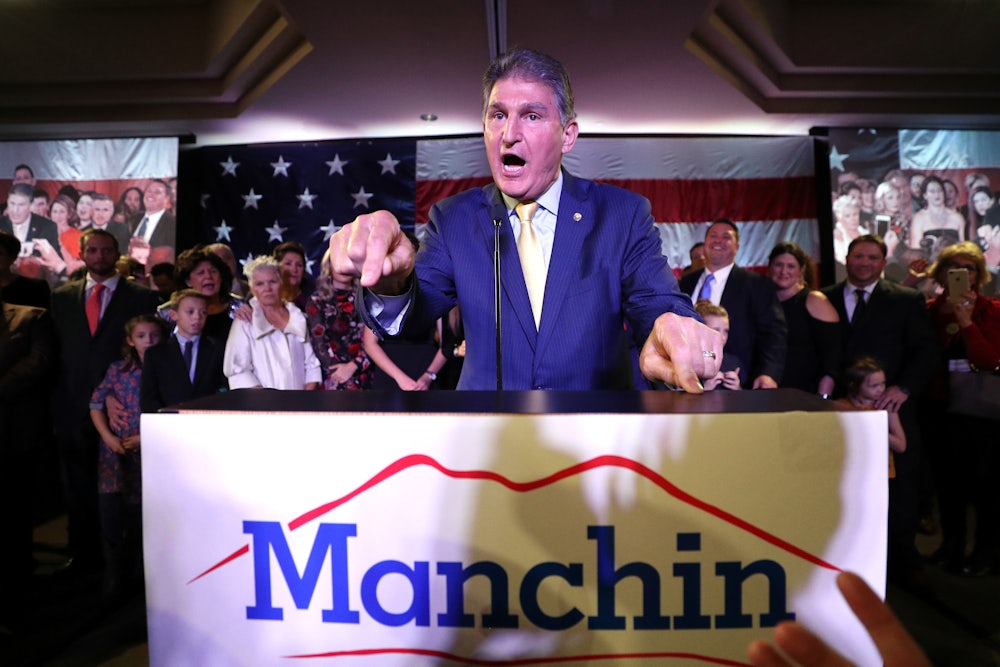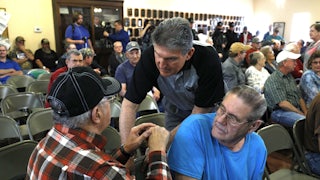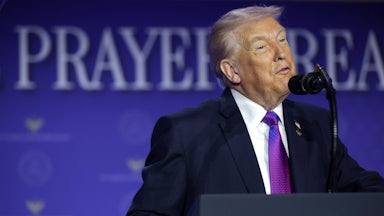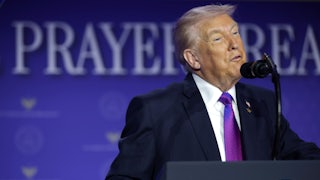Senator Joe Manchin has been a stumbling block for nearly every aspect of the Biden administration’s agenda—whether it is climate policy, paid family leave, or a new Food and Drug Administration chief. As a result, he’s drawn lots of attention from activists who’ve held protests at his offices, blockaded his Maserati, and even showed up in kayaks at his houseboat.
Many of these protesters are from Manchin’s home state of West Virginia. Notably absent in these efforts to lobby Manchin, however, are elected Democrats and party officials in the Mountain State.
While a few Democrats have spoken out to urge him to support the Biden agenda, most elected officials have remained publicly silent. For the most part, they do not attend the protests. They are not penning op-eds in state newspapers.
“People are afraid of Joe Manchin. He’s the king of the West Virginia Democratic Party, and it’s very hard to find anyone who’s willing to speak out against him,” said Shane Assadzandi, chairman of the Monongalia County Democratic Executive Committee, which is home to Morgantown and West Virginia University. “I’ve had people tell me West Virginia doesn’t have a Democratic Party. We have a Joe Manchin party.”
It is undeniable that Manchin wields a lot of power in the West Virginia Democratic Party. This is partly because he is the only remaining Democrat in statewide office. But his control of the party began long before the state went red. Manchin became “king” after he was elected to his first term as governor in 2004.
“When you become governor, you get the chance to nominate the party chairman,” explained Jeff Kessler, a former West Virginia Senate president and gubernatorial candidate.
Manchin used this privilege to nominate his campaign treasurer, Nick Casey, who was then elected chairman by the party’s state executive committee members. When Casey gave up the job in 2010, Manchin nominated his longtime chief of staff, Larry Puccio, who was also elected chairman and served until 2015. “He knew control of the Democratic Party of West Virginia was control of the state,” said Chris Regan, a lawyer and former vice chair of the party.
That’s how it used to be, anyway. It is easy to forget now, but West Virginia was a very blue state until relatively recently. The state legislature was controlled by Democrats for over 80 years, until Republicans flipped both houses in 2014. Only 14 of the state’s 36 governors have been Republicans—and current Governor Jim Justice, a Republican, was elected to his first term as a Democrat.
But even as Democrats have continued to lose power in the state, Manchin’s influence in the party has remained strong. “I would say the vast majority of people in the county and state executive committees do not want to buck the Manchin Machine,” Assadzandi said.
In fact, several Democrat officials and operatives declined to speak on the record for this article for fear of upsetting Manchin or the state party. Assadzandi was not one of them. His group, the Monongalia County Democrats, is among the few that have been vocal in their support of Biden’s agenda as well as their frustration with Manchin. Assadzandi’s own Twitter bio reads, “He/Him. Progressive. Democrat. WV. @Sen_JoeManchin is 80% of the reason I have high blood pressure.”
The group recently issued a statement supporting the full $3.5 trillion Build Back Better Act and urging Manchin to end the filibuster. “We felt it was our responsibility to speak out because the state party, frankly, has not,” Assadzandi said.
The West Virginia Democratic Party’s social media accounts and website contain no statements about bills currently stumbling through Congress, other than the Freedom to Vote Act—a compromise bill birthed from Manchin’s opposition to the earlier For the People Act. There are posts and press releases celebrating the passage of the infrastructure-focused portion of Biden’s Build Back Better plan, but there was nothing prior to its passage.
Party Chairwoman Belinda Biafore, who lives in Manchin’s hometown of Fairmont, says there’s a reason for that. “The way to get [Manchin’s] attention is not to blast him on social media,” she said. But Biafore maintains that this does not mean the party has been silent about the goings-on in Congress. “Did the party itself publicly go out and push him? No,” she said. “But did we as a committee reach out to Joe Manchin and express our concerns and views and ideas? Yes.”
She added: “For us to bad-mouth him or make him look bad … for goodness’ sakes, he’s the lone Democrat we have left.”
This approach might appeal to Manchin’s sensibilities, but it’s leading to frustration among rank-and-file members who don’t get to see behind-the-scenes conversations and just assume the state party isn’t doing anything at all.
Former West Virginia Secretary of State Natalie Tennant lost her reelection bid in 2016 but has remained active, lobbying Manchin on voting rights legislation. She frequently appears at county executive committee and Democratic Women meetings around the state. In her travels, Tennant says she has detected a frustration among party members who believe Biden’s initiatives will benefit West Virginians—only to see their lone Democrat lawmaker oppose the legislation.
“The people that will campaign for you, the people that will make phone calls for you, the people we depend on, are not happy with Joe Manchin. And I don’t know if he knows that,” she said. “They don’t understand why he is acting like this. Is it only for him?”
Biafore suspects many West Virginia Democrats are like Manchin himself—generally supportive of the Biden administration’s initiatives but worried how they will be funded. “They don’t want their taxes to go up,” she said. Still, she agrees some voters are probably frustrated. “I know people get tired of this bipartisan effort. But that’s just him,” she said.
Biafore said Manchin’s desire to ensure bipartisan support on legislation goes back to his days as governor. Although Democrats held a supermajority in the state legislature at the time, Manchin always attempted to bring Republicans on board with his proposed bills. “That’s been his M.O. for his entire elected life,” she said. “That’s the way politics should work.”
Kessler, the former West Virginia Senate president, attributed Manchin’s stonewalling to a different feature of the senator’s personality. He said the former governor often wants things accomplished on his terms alone.
In 2010, Manchin proposed a bill to repeal the state’s tax on business inventory. Kessler, then chairman of the Senate Judiciary Committee, killed the legislation because no one—from the state Chamber of Commerce to the West Virginia’s Manufacturers Association to the labor unions—wanted the tax repealed.
It was the only piece of Manchin’s 12-bill agenda that did not pass. “I remember him calling me the next day and saying, ‘What’s the problem?!’ I said, ‘Governor, no one likes it,’” Kessler said. “He got angry with me. I said, ‘Hell, Joe, 11 out of 12 is a pretty damn good percentage.”
Kessler attracted the Manchin camp’s ire again in 2015 when he nominated Chris Regan to replace Biafore after the party’s catastrophic losses in 2014. “It was, ‘We’re just going to run the same playbook,’” he said. “It was pretty obvious the leadership had to change.”
Regan lost in a 41–26 vote and was then removed from his vice chairmanship. Biafore—and by extension, Manchin—has remained in control of the party, and Democrats have continued to lose ground. “It’s been disastrous,” Kessler said.
Assadzandi said he is concerned having Manchin at the top of the ballot in 2024 will drive down Democratic voter turnout. “It’s very hard to motivate people to vote for Joe Manchin,” he said.
“I hope Democrats in West Virginia who are frustrated, I hope they see that not as a signal to leave the party … but to double down and start building the post–Joe Manchin Democratic Party,” he said.
But Biafore suggested more Democrats should follow the senator’s example if they want to win in West Virginia. “Right now, the only Democrat winning is Joe Manchin. Maybe folks ought to play off him a little bit more,” she said. “He’s doing something right.”
Kristen Olsen sees things a bit differently.
Olsen is a mom and a former public school teacher who currently teaches parenting classes for welfare recipients. She is also a newly minted activist. She joined the Poor People’s Campaign in February 2021 after seeing the Reverend Dr. William J. Barber II of North Carolina on television talking about the “moral revival” and its aim, as the group’s Twitter bio puts it, to “overcome systemic racism, poverty, ecological devastation and the war economy.”
As part of the campaign, Olsen has left Manchin lots of voicemails and sent lots of postcards. She’s been to his offices several times. She has never been able to speak to Manchin directly. But she knows what she’d say.
“I would encourage him to meet with people like me,” she said. “There’s an obvious disconnect in his understanding of what regular people need. Does he ever worry about what he’s going to eat for lunch or how he’s going to pay if he needs a cavity filled?”
She’s frustrated that Manchin is blocking legislation that would help working families. But she’s perplexed by Manchin’s concerns that expanded social programs would create an entitlement society. “It just doesn’t make any sense to me that’s what he thinks,” she said.
She says low-income people aren’t looking for entitlements—they just want an economic system that isn’t actively working against them. Before taking her current job, Olsen received public assistance. A state program paid part of her childcare costs so daycare for her young son was $30 a week. Now Olsen makes too much to qualify for that program, and day care costs $300 a week. It’s no wonder, Olsen said, some parents choose to remain unemployed. “These systems are broken in a way to keep people down,” she said.
Olsen is a Democrat and has voted for Manchin in the past. “I won’t again,” she said. But Manchin seems to feel that, come 2024, he can do without her vote.






